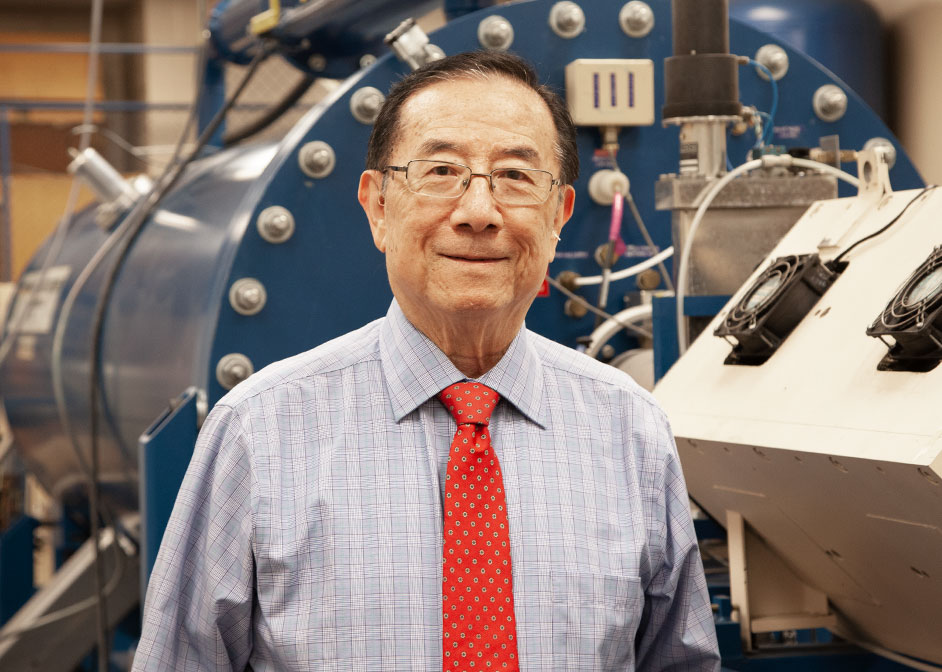Chu Won Conference of Southern Graduate Schools’ Award
An old Chinese proverb says, give a man a fish, and you will feed him for a day. Teach a man to fish, and you feed him for a lifetime.

This is part of Cullen University Professor of Physics Wei-Kan Chu’s personal teaching philosophy that has guided his 40-plus year career advising more than 28 Ph.D. students, the bulk of it at the University of Houston’s College of Natural Sciences and Mathematics and Texas Center for Superconductivity.
His dedication to and excellence mentoring the next generation’s scientific leaders garnered him two awards, most recently the Conference of Southern Graduate Schools’ (CSGS) 2021 Outstanding Graduate Mentor Award. In 2020, he received the inaugural UH Graduate School’s Outstanding Graduate Mentor Award.
“More than 90 universities sent faculty nominations for the CSGS award,” said Chu. “I am very fortunate to have received this award. I feel like it was winning a lottery ticket.”
UH nominated Chu for the Conference of Southern Graduate Schools award after he won the University’s award.
“Professor Chu is an inspirational graduate mentor who cultivates scientific excellence and critical thinking, provides valuable career mentoring and serves as a lifelong mentor to his graduate students,” said Sarah Larsen, vice provost and dean of the graduate school.
Former students speak highly of Chu, thanking him for instilling independence and inspiring them to pursue their innate curiosity.
In his nominating letter to the CSGS, Lin Shao (Ph.D. ’01), professor of nuclear engineering at Texas A&M University, writes Chu is among the world’s preeminent physicists in the field of particle-solid interactions, ion-beam characterization and modification of materials. But what made Chu standout as a mentor was what Shao calls “philosophic mentoring.”
“One important thing I learned from him is to always read publications with questions and doubts,” writes Shao. “We were mentored to learn from the literature but never to lose our own thoughts, even if the literature was his work.”
Di Chen, one of Shao’s former Ph.D. students at A&M, is now a research assistant professor of physics at UH, under Chu’s leadership. He said most of what Shao taught him stems from what Chu taught Shao, attesting to Chu’s commitment to excellence throughout generations.
“Dr. Chu views things from a very high level,” said Chen. “What he cares about is not just limited to the project or research work. He cares about what you can gain from the work in the depth of your heart. He is like a philosopher. He uses all his life experiences to share with me lessons.”
A New Take on an Old Proverb
Expounding on his personal mentoring philosophy, Chu said he interviews his incoming graduate students and seeks to measure their drive, imagination and creativity.
“I feel that in graduate school, we don’t want to train another bookworm. We want a student who does not only gathers knowledge but is also able to create knowledge.”
Throughout his graduate students’ 5- to 6-year education, he ascertains what their strengths are and tries to steer them in that direction.
He also emphasizes that students try to find their own research topic, not one assigned by him. This can be difficult for a young researcher.
“Quite frequently, a student will come in and ask me ‘what should I do today,’ and I say that’s the worst question I’ve ever gotten from you. If you don’t know what you want to do, don’t ask me.” This technique can be beneficial for students who are creative, he adds, but not good for students who are more reactive than proactive.
He trains his students to be better decision-makers in all areas of life: academically, professionally, personally.
For example, one of his students received several offers after graduation and came to him asking which one should he pick. “I looked at those offers and said ‘pick this one,’ and he said ‘wow, this is the last one on my list.’”
The student asked him why, and Chu replied saying it’s because this was a small, young, dynamic company. “Your skill would be matched there. If you pick this company, you will shine, and people will recognize your talent. But if you pick this larger company, you will be one of 40,000 people. Nobody knows you. You will become frustrated.”
Chu has updated the old Chinese proverb to this: give a man a fish, and you will feed him for a day. Teach a man to fish, and you feed him for a lifetime. And for those who are truly outstanding, create a fishery, where the fish are so abundant, they benefit society.
- Rebeca Trejo, College of Natural Sciences and Mathematics